MISRA C:2012
Addendum 1 — Rule Mappings
March 2013
�
First published March 2013 by MIRA Limited
Watling Street
Nuneaton
Warwickshire
CV10 0TU
UK
www.misra.org.uk
© MIRA Limited 2013.
“MISRA”, “MISRA C” and the triangle logo are registered trademarks of MIRA Limited, held on behalf of
the MISRA Consortium.
All rights reserved. No part of this publication may be reproduced, stored in a retrieval system or
transmitted in any form or by any means, electronic, mechanical or photocopying, recording or
otherwise without the prior written permission of the Publisher.
ISBN 978-1-906400-12-5 PDF
British Library Cataloguing in Publication Data
A catalogue record for this book is available from the British Library
�
MISRA C:2012 Addendum: Rule Mappings
MISRA C:2004 to MISRA C:2012 rule mapping
MISRA C:2004
MISRA C:2012
Significant changes from MISRA C:2004 for C90 code
Rule 1.1 (required)
Rule 1.1 (required)
Rule 1.2 (advisory)
Rule 1.2 (required)
Rule 1.3 (required)
The requirement that code conform to a version of
the standard has moved into an introductory section.
MISRA C:2004 Rule 1.1 had an implied ban on extensions.
MISRA C:2012 Rule 1.1 permits extensions, but they are
restricted by the new advisory Rule 1.2.
Relaxed to permit unspecified behaviour that is not
considered critical. MISRA C:2012 Appendix H lists the
issues that are covered.
Rule 1.3 (required)
Dir 1.1 (required)
Changed to a directive as it is not a statically checkable rule.
Rule 1.4 (required)
Dir 1.1 (required)
Changed to a directive as it is not a statically checkable rule.
Rule 1.5 (advisory)
Dir 1.1 (required)
Changed to a directive as it is not a statically checkable rule.
Rule 2.1 (required)
Dir 4.2 (advisory)
Tightened to require documentation of assembly usage.
Dir 4.3 (required)
Rule 2.2 (required)
Rule 1.2 (advisory)
Rule 2.3 (required)
Rule 3.1 (required)
Rule 2.4 (advisory)
Dir 4.4 (advisory)
Relaxed to permit // comments in C99 code.
Downgraded to advisory for C90.
Changed to a directive as MISRA C:2012 does not precisely
describe what constitutes code in a comment.
Rule 3.1 (required)
Dir 1.1 (required)
Changed to a directive as it is not a statically checkable rule.
Rule 3.2 (required)
Dir 1.1 (required)
Changed to a directive as it is not a statically checkable rule.
Rule 3.3 (advisory)
Dir 1.1 (required)
Changed to a directive as it is not a statically checkable rule.
It is not an issue for C99 because the standard specifies the
behaviour.
Rule 3.4 (required)
Dir 1.1 (required)
Changed to a directive as it is not a statically checkable rule.
Rule 3.5 (required)
Dir 1.1 (required)
Changed to a directive as it is not a statically checkable rule.
This issue is now covered by the Introduction to the Rules
section.
Relaxed to permit octal and hexadecimal escapes providing
that they are properly terminated. C90 Undefined 11 (an
undefined escape sequence is used) is now covered by
Rule 1.3.
Downgraded to advisory because there is no undefined
or unspecified behaviour associated with trigraphs. There
are certain source character sets in which it would be
impossible to write C programs without trigraphs.
Relaxed to permit the identifiers to be distinct up to the
limit allowed by the implementation.
Rule 3.6 (required)
Deleted
Rule 4.1 (required)
Rule 4.1 (required)
Rule 4.2 (required)
Rule 4.2 (advisory)
Rule 5.1 (required)
Rule 5.1 (required)
Rule 5.2 (required)
Rule 5.3 (required)
Rule 5.4 (required)
Rule 5.5 (required)
Rule 5.2 (required)
Rule 5.3 (required)
1
�
MISRA C:2004
MISRA C:2012
Significant changes from MISRA C:2004 for C90 code
Relaxed to permit tag names that are the same as typedef
names.
Relaxed to permit tag names that are the same as typedef
names.
Relaxed to permit static identifiers declared in a block to
have the same name as other identifiers.
Relaxed to permit identifiers such as labels and
enumeration constants that are not in the same scope to
have the same identifier.
Relaxed to permit identifiers such as structure members
names in different structures.
Relaxed to allow addition of plain char and a different
integer type, and subtraction of two plain char.
Rule 5.3 (required)
Rule 5.6 (required)
Rule 5.4 (required)
Rule 5.7 (required)
Rule 5.5 (advisory)
Rule 5.8 (required)
Rule 5.9 (advisory)
Rule 5.6 (advisory)
Deleted
Rule 5.7 (advisory)
Deleted
Rule 6.1 (required)
Rule 10.1 (required)
Rule 10.2 (required)
Rule 10.3 (required)
Rule 10.4 (required)
Rule 6.2 (required)
Rule 10.1 (required)
Rule 10.3 (required)
Rule 10.4 (required)
Rule 6.3 (advisory)
Dir 4.6 (advisory)
Rule 6.4 (required)
Rule 6.1 (required)
Relaxed to permit other legal C99 bit-field types
Rule 6.5 (required)
Rule 6.2 (required)
Rule 7.1 (required)
Rule 4.1 (required)
Rule 7.1 (required)
Rule 8.1 (required)
Rule 8.2 (required)
Rule 8.4 (required)
Rule 17.3 (mandatory)
Rule 8.2 (required)
Rule 8.1 (required)
Rule 8.3 (required)
Rule 8.3 (required)
Relaxed to permit unnamed bit-fields with a signed type to
be single-bit.
Relaxed to permit octal escape sequences providing they
are properly terminated.
Tightened to require all function types to be in prototype
form with named parameters.
Relaxed to permit function definitions with no separate
declaration if they have internal linkage.
Tightened to require all types to be explicitly stated,
e.g. structure members.
Rule 8.4 (required)
Rule 8.3 (required)
Tightened to require identical object types
Rule 8.5 (required)
Deleted
Rule 8.6 (required)
Deleted
2
This rule has been deleted because some programming
paradigms require the presence of executable code in
a header file. It is also desirable for inline functions to
appear in header files so as to avoid undefined issues. The
problems associated with multiple declaration/definition of
objects/functions are dealt with by other rules.
Relaxed to permit declarations using the extern keyword
at block scope, but more specific problems are caught by
other rules such as:
• Rule 1.3: Undefined behaviour due to use of the static
keyword
• Rule 8.3: Compatibility of multiply-declared/defined
objects/functions
MISRA C:2004 to MISRA C:2012 rule mapping�
MISRA C:2004
MISRA C:2012
Significant changes from MISRA C:2004 for C90 code
Rule 8.7 (required)
Rule 8.9 (advisory)
Downgraded to advisory because there are instances
where following this rule makes it impossible to perform
adequate unit testing.
Rule 8.8 (required)
Rule 8.5 (required)
Rule 8.9 (required)
Rule 8.6 (required)
Rule 8.10 (required)
Rule 8.7 (advisory)
Rule 8.11 (required)
Rule 8.8 (required)
Rule 8.12 (required)
Rule 8.11 (advisory)
Rule 9.1 (required)
Rule 9.1 (mandatory)
Rule 9.2 (required)
Rule 9.2 (required)
Rule 9.3 (required)
Rule 9.3 (required)
Rule 8.12 (required)
Rule 10.1 (required)
Rule 10.3 (required)
Rule 10.4 (required)
Rule 10.6 (required)
Rule 10.7 (required)
Rule 10.2 (required)
Rule 10.3 (required)
Rule 10.4 (required)
Rule 10.6 (required)
Rule 10.7 (required)
Downgraded to advisory because there are instances
where following this rule makes it impossible to perform
adequate unit testing.
Tightened to require inclusion of the size for arrays with
external linkage, even if defined implicitly by initialization.
Relaxed to permit use of {0} in subarrays or sub-
structures.
Relaxed to permit initialization with a string literal.
Relaxed to permit partial initialization providing all
members are unique
Tightened to include plain char, Boolean and enumerated
types.
Relaxed to permit implicit widening conversions on function
arguments or return values.
Relaxed to permit signed integer constants to be used
in unsigned contexts, providing the value is within the
unsigned range.
Relaxed to permit implicit widening conversions on function
arguments or return values.
Rule 10.3 (required)
Rule 10.8 (required)
Tightened to include plain char, Boolean and enumerated
types.
Rule 10.4 (required)
Rule 10.8 (required)
Rule 10.5 (required)
Deleted
Rule 10.6 (required)
Rule 7.2 (required)
Rule 11.1 (required)
Rule 11.1 (required)
Rule 11.2 (required)
Rule 11.1 (required)
Rule 11.2 (required)
Rule 11.5 (advisory)
Rule 11.7 (required)
This rule has been deleted as it did not adequately address
the underlying problem. The enhanced type rules address
some of the issues previously covered by this rule.
Tightened to include conversions to/from integral types.
Relaxed to permit conversions from a null pointer constant,
and conversion to void.
Tightened to include conversions from void *, and to/from
Boolean, plain char and enumeration types.
3
MISRA C:2004 to MISRA C:2012 rule mapping�
MISRA C:2004
MISRA C:2012
Significant changes from MISRA C:2004 for C90 code
Rule 11.3 (advisory)
Rule 11.1 (required)
Rule 11.2 (required)
Rule 11.4 (advisory)
Rule 11.6 (required)
Rule 11.4 (advisory)
Rule 11.3 (required)
Upgraded to required. Relaxed to permit casts that convert
into pointer to character types.
Rule 11.5 (required)
Rule 11.8 (required)
Rule 12.1 (advisory)
Rule 12.1 (advisory)
Rule 12.2 (required)
Rule 13.2 (required)
Rule 12.3 (required)
Rule 13.6 (mandatory)
Rule 12.4 (required)
Rule 13.5 (required)
Rule 12.5 (required)
Rule 12.1 (advisory)
Rule 12.6 (advisory)
Rule 10.1 (required)
Rule 12.7 (required)
Rule 10.1 (required)
Rule 12.8 (required)
Rule 12.2 (required)
Rule 12.9 (required)
Rule 10.1 (required)
Rule 12.10 (required)
Rule 12.3 (advisory)
Rule 12.11 (advisory)
Rule 12.4 (advisory)
Rule 12.12 (required)
Dir 1.1 (required)
Rule 12.13 (advisory)
Rule 13.3 (advisory)
Rule 13.1 (required)
Rule 13.4 (advisory)
Rule 13.2 (advisory)
Rule 14.4 (required)
Rule 13.3 (required)
Dir 1.1 (required)
Rule 13.4 (required)
Rule 14.1 (required)
Rule 13.5 (required)
Rule 14.2 (required)
Rule 13.6 (required)
Rule 14.2 (required)
Rule 13.7 (required)
Rule 14.3 (required)
4
Rule 14.1 (required)
Rule 2.1 (required)
Tightened MISRA C:2004 Rule 12.1 by describing the rule’s
advice in terms of the language syntax.
Relaxed to permit sizeof to be applied to an expression
whose only side effect is to read from a volatile object.
Relaxed to permit postfix, unary and cast operands of &&
and || without brackets.
Downgraded to advisory, as there are occasions where
there are no easy ways in which to achieve the same effect.
Changed to a directive as it is not a statically checkable rule.
Relaxed to permit ++ and -- to be mixed with other
operators, provided that the ++ or -- is the only source of
side-effects.
Tightened so that the result of an assignment operator can
not be used anywhere. For example, a[x=y]=x;
Downgraded to advisory as the more important issues
are addressed by other MISRA C:2012 required rules. For
example:
• Rule 13.2 covers evaluation order of side effects.
Focussing on one aspect of floating-point arithmetic (as in
MISRA C:2004 Rule 13.3) attached too much importance
to that aspect and might give users a false sense of
confidence.
Relaxed to permit objects with floating-point type in the
controlling expression, providing they are not a loop counter.
Relaxed to permit invariant Boolean expressions in other
contexts, such as assignments. This was the original
intention for MISRA C:2004 Rule 13.7.
MISRA C:2004 to MISRA C:2012 rule mapping�
MISRA C:2004
MISRA C:2012
Significant changes from MISRA C:2004 for C90 code
Tightened to include assignments to variables that are not
subsequently read.
Relaxed to permit null statements in more places.
MISRA C:2012 Rule 15.6 focuses on the detection of
problems such as if(C);{...} .
Downgraded to advisory but there are additional required
rules in case Rule 14.1 is not applied. Historically, there has
been much debate over the advisability of using constructs
such as goto. The intervening years have also seen an
improvement in tools, which permit a better analysis of
code with more complicated structures.
Historically, there has been much debate over the
advisability of using constructs such as goto and continue.
The rationale given in MISRA C:2004 Rule 14.5 was weak
— it cites structured programming, but continue is a
structured programming construct. The intervening years
have also seen an improvement in tools, which permit a
better analysis of code with more complicated structures.
Relaxed to include using goto for the same purpose.
Note: Use of goto assumes that rule MISRA C:2012 Rule 14.1
has not been applied.
Downgraded to advisory.
Downgraded to advisory as there may be good reasons for
having multiple exit paths (as for multiple break statements).
Relaxed to permit the default label to occur as either first or
last switch-clause.
Relaxed to permit the default label to occur as either first or
last switch-clause.
Tightened to include all uses of the features provided by
.
Rule 14.2 (required)
Rule 2.2 (required)
Rule 14.3 (required)
Rule 15.6 (required)
Rule 14.4 (required)
Rule 15.1 (advisory)
Rule 15.2 (required)
Rule 15.3 (required)
Rule 14.5 (required)
Deleted
Rule 14.6 (required)
Rule 15.4 (advisory)
Rule 14.7 (required)
Rule 15.5 (advisory)
Rule 14.8 (required)
Rule 15.6 (required)
Rule 14.9 (required)
Rule 15.6 (required)
Rule 14.10 (required)
Rule 15.7 (required)
Rule 15.0 (required)
Rule 16.1 (required)
Rule 15.1 (required)
Rule 16.2 (required)
Rule 15.2 (required)
Rule 16.3 (required)
Rule 15.3 (required)
Rule 16.4 (required)
Rule 16.5 (required)
Rule 15.4 (required)
Rule 16.7 (required)
Rule 15.5 (required)
Rule 16.6 (required)
Rule 16.1 (required)
Rule 17.1 (required)
Rule 16.2 (required)
Rule 17.2 (required)
Rule 16.3 (required)
Rule 8.2 (required)
Rule 16.4 (required)
Rule 8.3 (required)
Rule 16.5 (required)
Rule 8.2 (required)
Rule 16.6 (required)
Rule 8.2 (required)
Rule 17.3 (mandatory)
Rule 16.7 (advisory)
Rule 8.13 (advisory)
Rule 16.8 (required)
Rule 17.4 (mandatory)
5
MISRA C:2004 to MISRA C:2012 rule mapping�
MISRA C:2004
MISRA C:2012
Significant changes from MISRA C:2004 for C90 code
Rule 16.9 (required)
Deleted
Rule 16.10 (required)
Dir 4.7 (required)
Rule 17.1 (required)
Rule 18.1 (required)
Rule 17.2 (required)
Rule 18.2 (required)
Rule 17.3 (required)
Rule 18.3 (required)
Rule 17.4 (required)
Rule 18.4 (advisory)
Rule 17.5 (advisory)
Rule 18.5 (advisory)
Rule 17.6 (required)
Rule 18.6 (required)
Rule 18.1 (required)
Rule 1.3 (required)
Rule 18.2 (required)
Rule 19.1 (mandatory)
Rule 18.3 (required)
Deleted
Relaxed to permit the use of function name on its own. The
issues raised by MISRA C:2004 Rule 16.9 are now covered
by the set of type checking rules: MISRA C:2012 Rules
10.1–10.4.
Changed to directive as MISRA C:2012 does not specify
which functions return error information or how the check
should occur.
Relaxed to permit ++ and -- on pointers.
Downgraded to advisory.
Relaxed to permit incomplete types, providing undefined
behaviour does not occur.
This rule has been deleted because its interpretation is
subjective and it is not statically checkable.
Rule 18.4 (required)
Rule 19.2 (advisory)
Downgraded to advisory.
Rule 19.1 (advisory)
Rule 20.1 (advisory)
Rule 19.2 (advisory)
Rule 20.2 (required)
Rule 19.3 (required)
Rule 20.3 (required)
Rule 19.4 (required)
Rule 20.4 (required)
Tightened to include use of \.
Upgraded to required.
Relaxed so that the only thing not permitted is to define a
macro with the same name as a keyword.
Other MISRA C:2012 rules covers the issues that
MISRA C:2004 Rule 19.4 was addressing. For example:
• Rule 12.1 requires use of parenthesis to make the
precedence of an expression clear.
• Rule 14.6 requires that a macro with more than 1
statement does not get expanded in an iteration or
selection statements.
• Rules 10.1–10.4 prevent
#define INTPTR int *
INTPTR a, b;
The user could not use b as if it were a pointer without
violating a MISRA type check rule.
Rule 19.5 (required)
Deleted
This rule dealt with a stylistic issue.
Rule 19.6 (required)
Rule 20.5 (advisory)
Downgraded to advisory.
Rule 19.7 (advisory)
Dir 4.9 (advisory)
Rule 19.8 (required)
Rule 1.3 (required)
Rule 19.9 (required)
Rule 20.6 (required)
In C90 the behaviour is undefined and is caught by rule
MISRA C:2012 Rule 1.3.
6
MISRA C:2004 to MISRA C:2012 rule mapping�
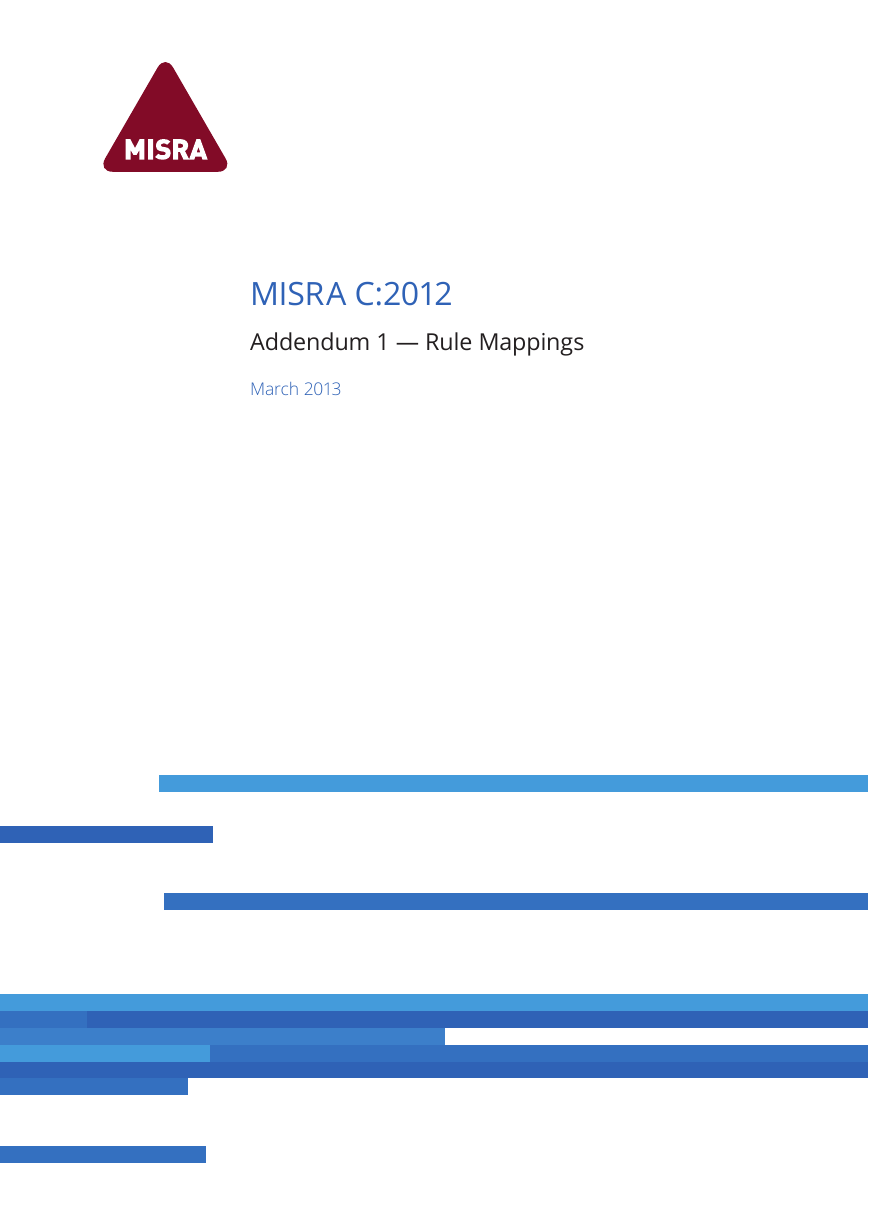
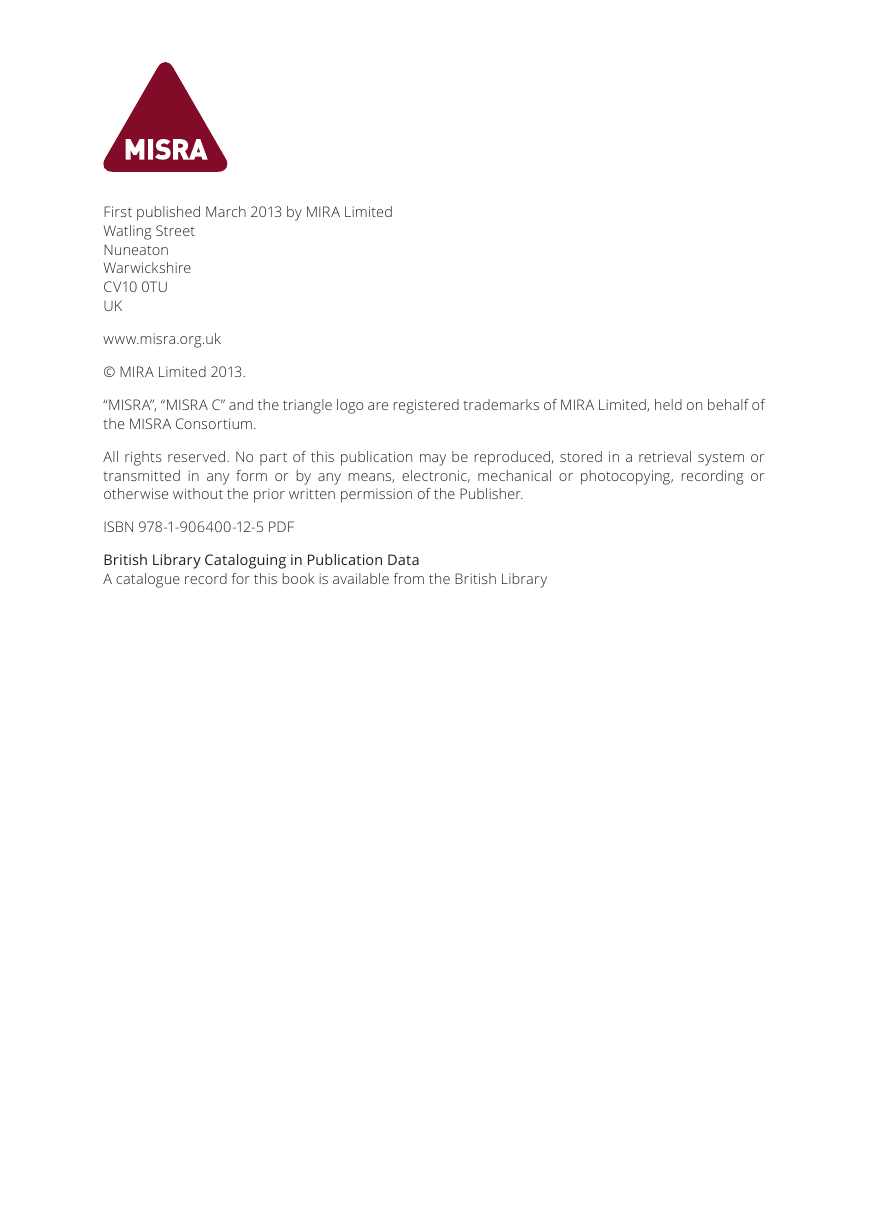
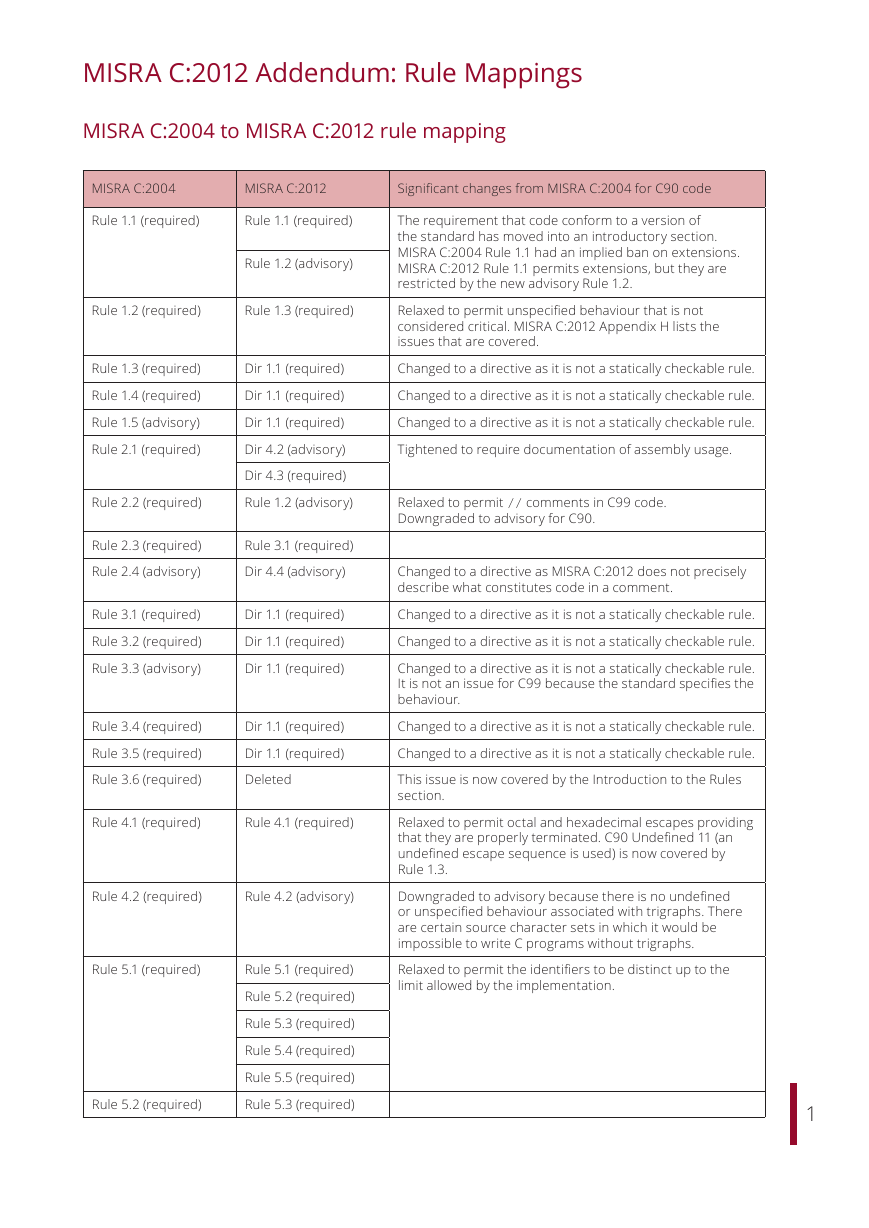
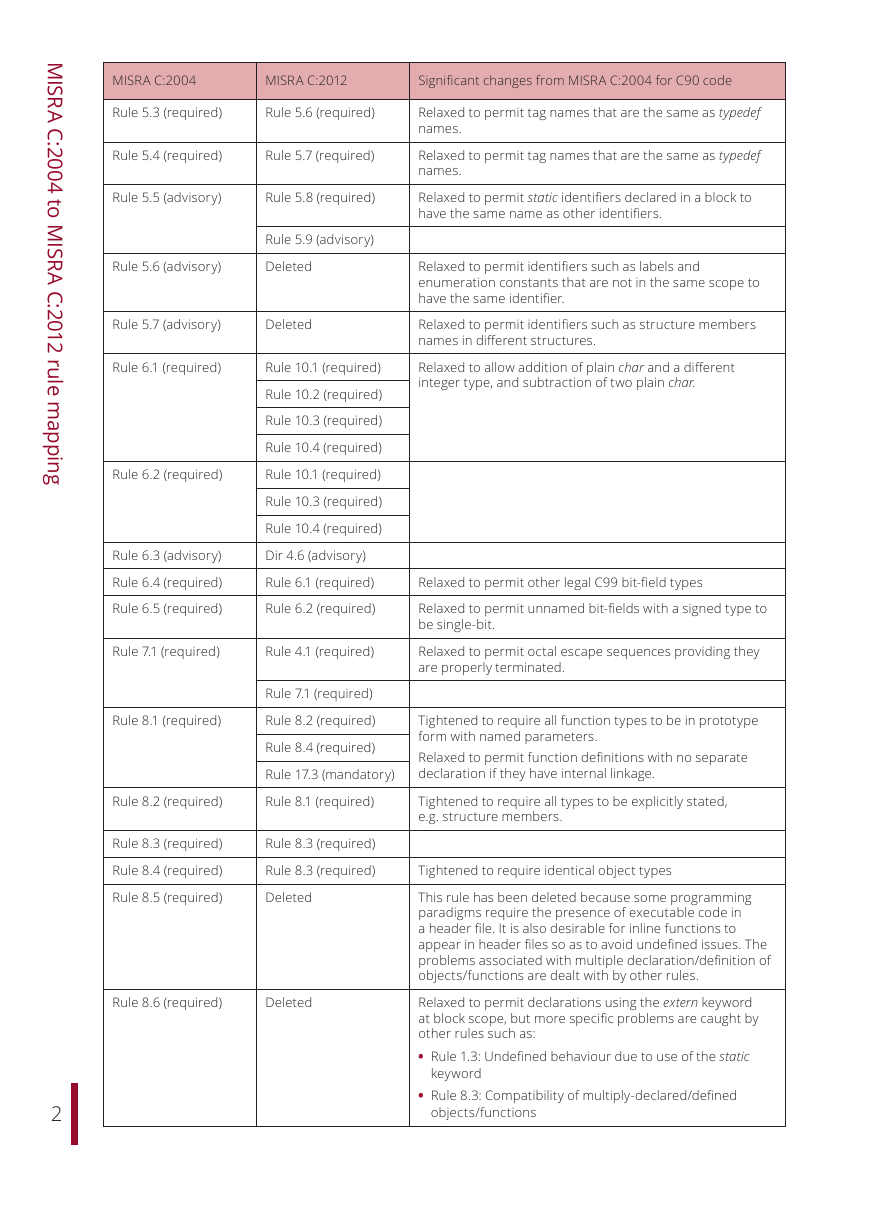
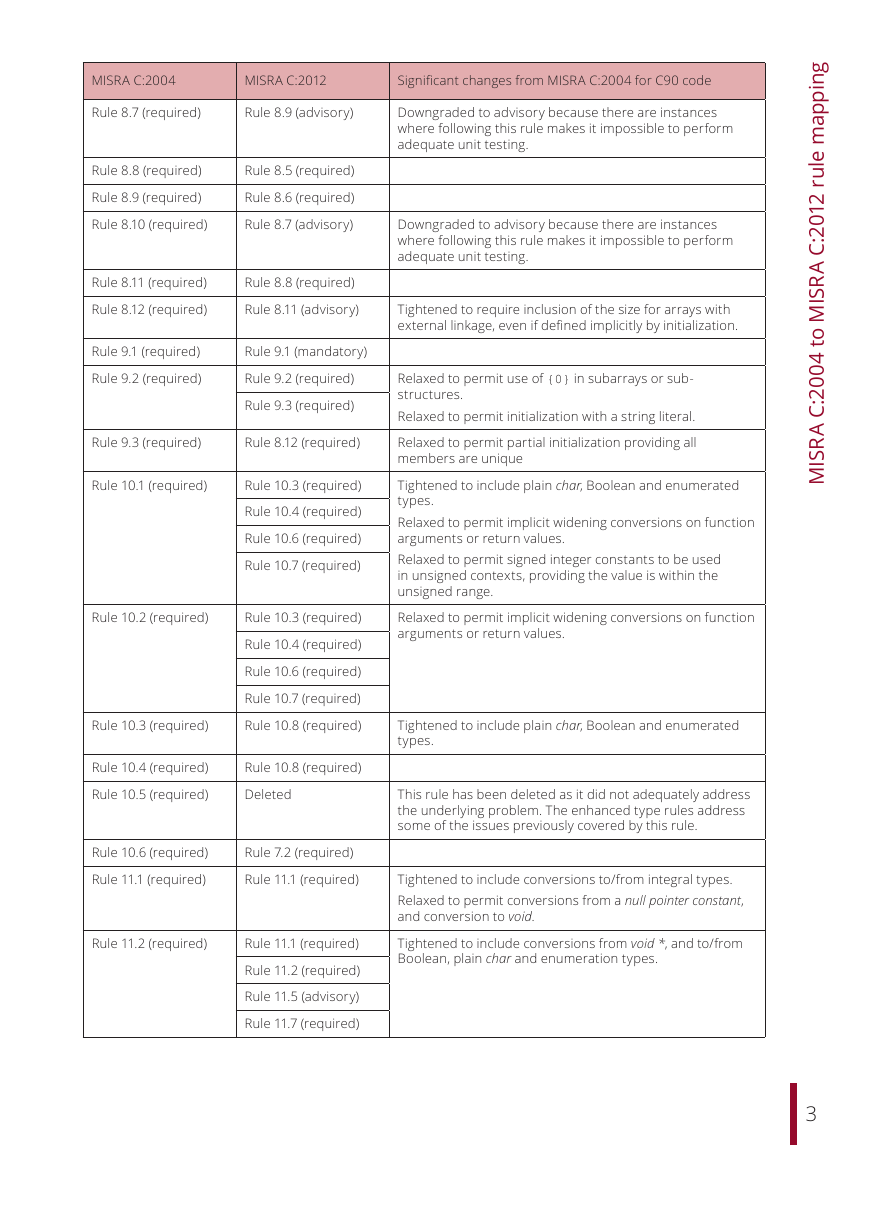
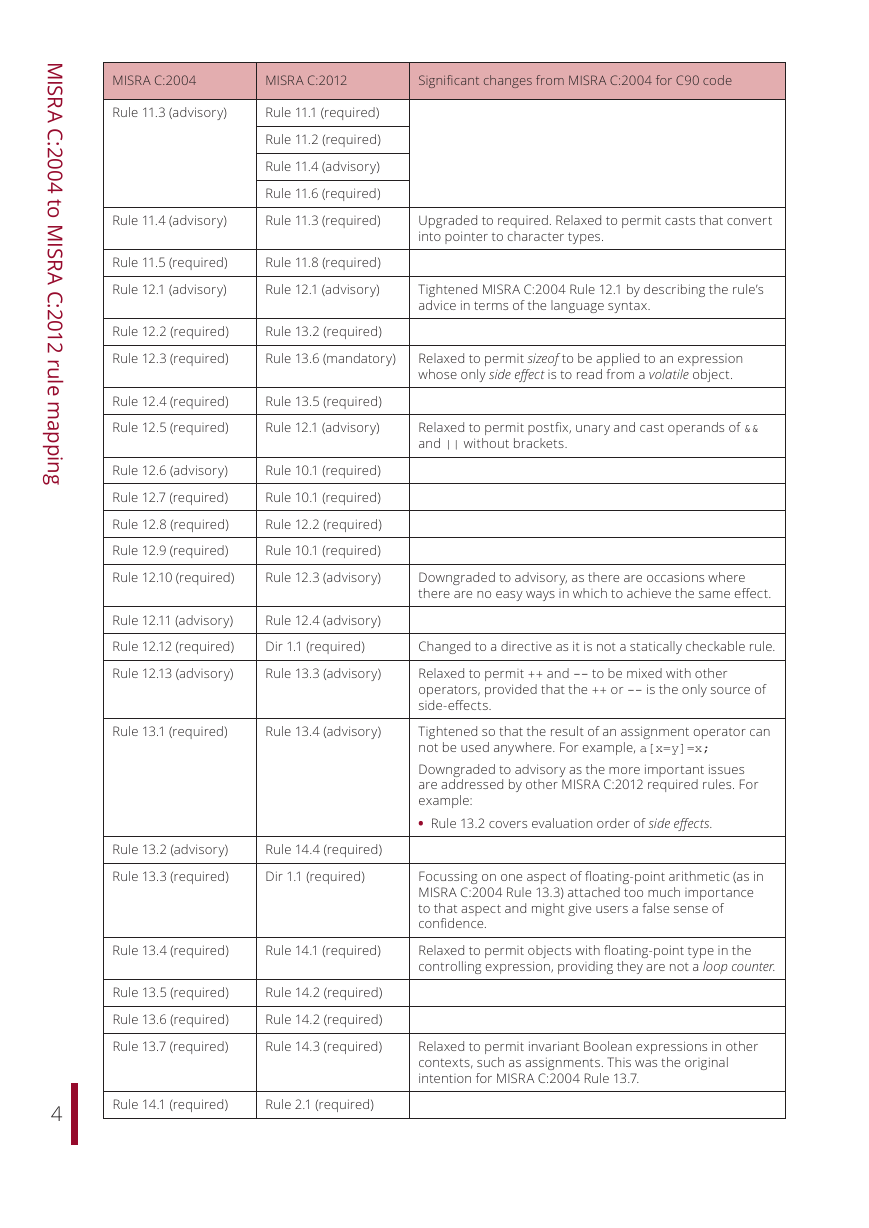
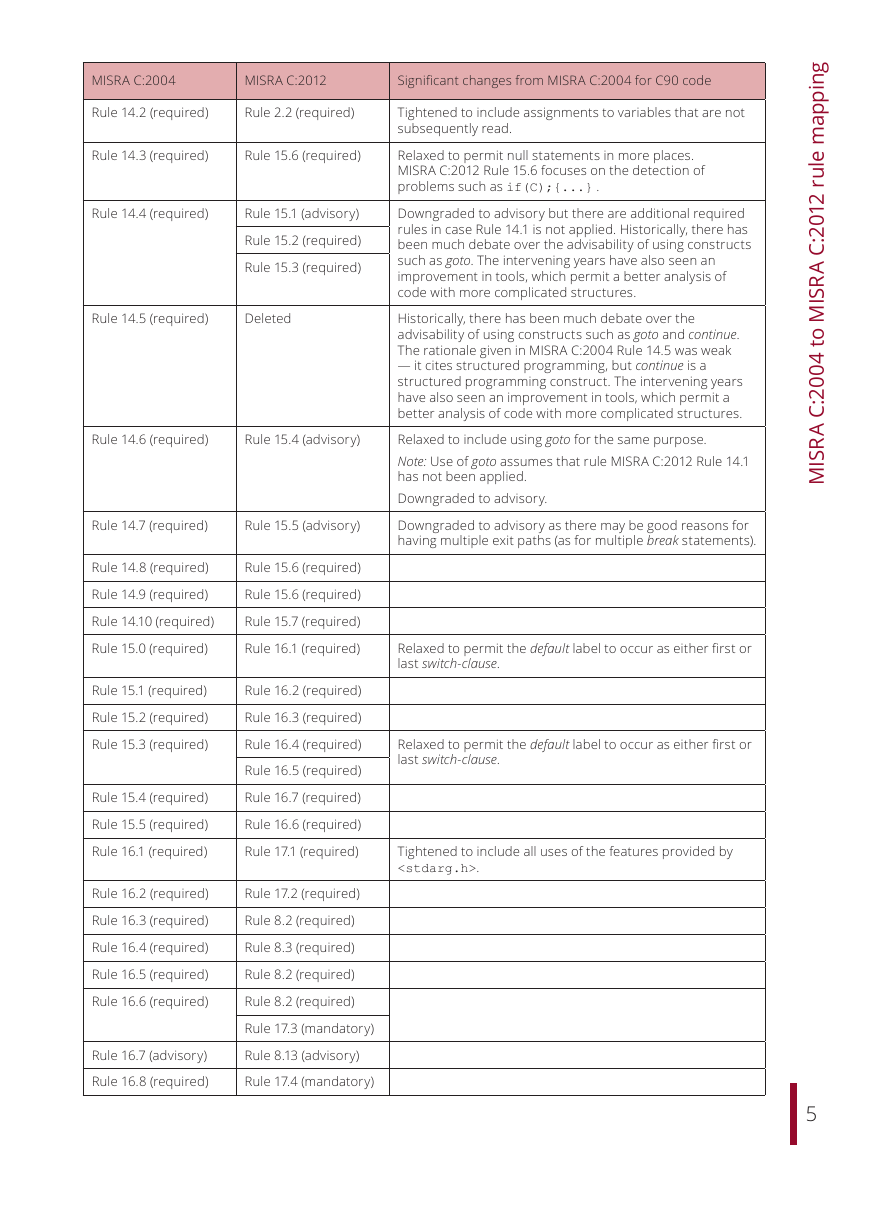
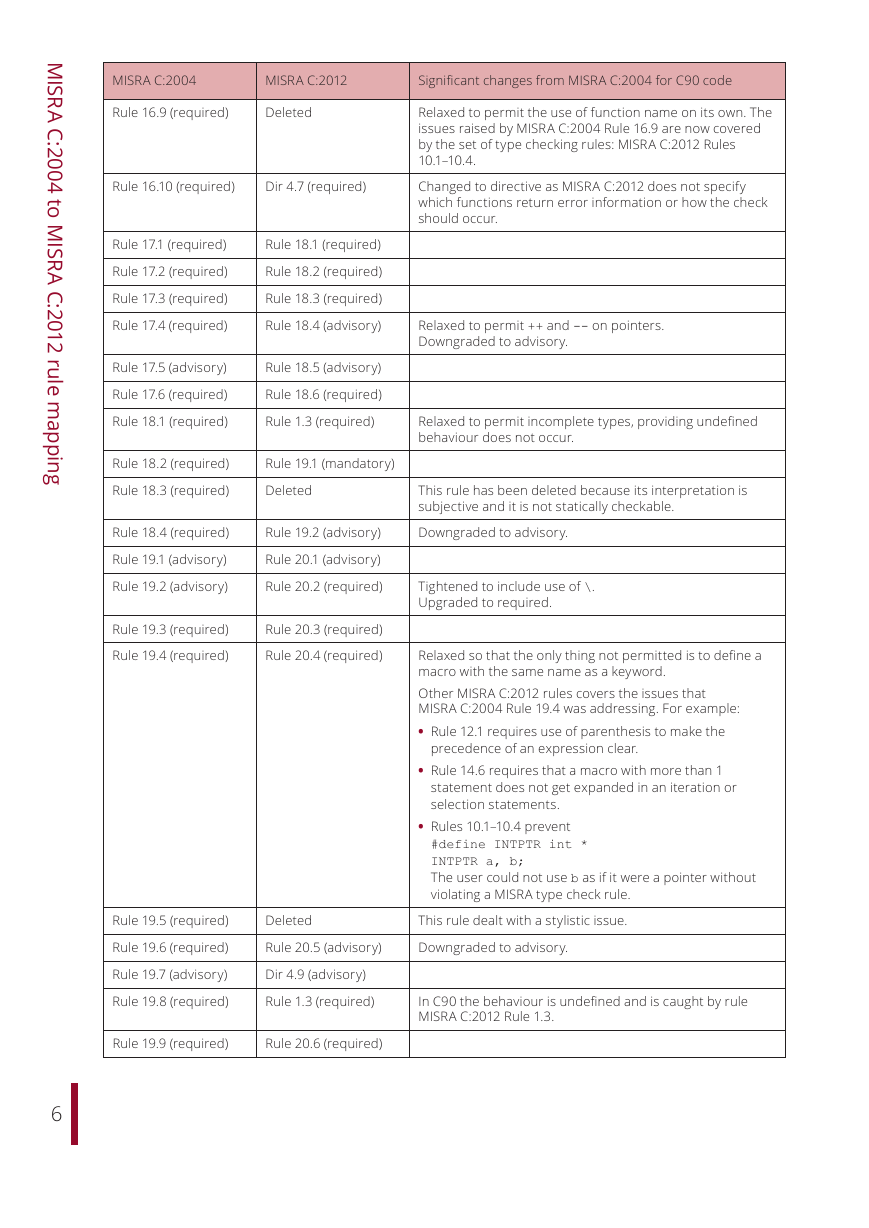








 2023年江西萍乡中考道德与法治真题及答案.doc
2023年江西萍乡中考道德与法治真题及答案.doc 2012年重庆南川中考生物真题及答案.doc
2012年重庆南川中考生物真题及答案.doc 2013年江西师范大学地理学综合及文艺理论基础考研真题.doc
2013年江西师范大学地理学综合及文艺理论基础考研真题.doc 2020年四川甘孜小升初语文真题及答案I卷.doc
2020年四川甘孜小升初语文真题及答案I卷.doc 2020年注册岩土工程师专业基础考试真题及答案.doc
2020年注册岩土工程师专业基础考试真题及答案.doc 2023-2024学年福建省厦门市九年级上学期数学月考试题及答案.doc
2023-2024学年福建省厦门市九年级上学期数学月考试题及答案.doc 2021-2022学年辽宁省沈阳市大东区九年级上学期语文期末试题及答案.doc
2021-2022学年辽宁省沈阳市大东区九年级上学期语文期末试题及答案.doc 2022-2023学年北京东城区初三第一学期物理期末试卷及答案.doc
2022-2023学年北京东城区初三第一学期物理期末试卷及答案.doc 2018上半年江西教师资格初中地理学科知识与教学能力真题及答案.doc
2018上半年江西教师资格初中地理学科知识与教学能力真题及答案.doc 2012年河北国家公务员申论考试真题及答案-省级.doc
2012年河北国家公务员申论考试真题及答案-省级.doc 2020-2021学年江苏省扬州市江都区邵樊片九年级上学期数学第一次质量检测试题及答案.doc
2020-2021学年江苏省扬州市江都区邵樊片九年级上学期数学第一次质量检测试题及答案.doc 2022下半年黑龙江教师资格证中学综合素质真题及答案.doc
2022下半年黑龙江教师资格证中学综合素质真题及答案.doc